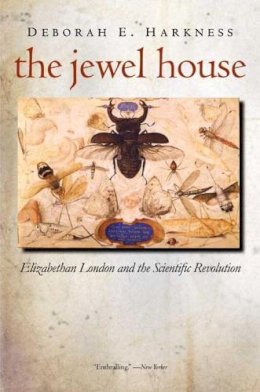Deborah E. Harkness is professor of history, University of Southern California. She is the author of John Dee’s Conversations with Angels: Cabala, Alchemy, and the End of Nature and of the New York Times bestseller A Discovery of Witches.
"Harkness's research is revelatory and her taste for the offbeat enthralling."—New Yorker ". . . Harkness has written a truly wonderful book, deeply researched, full of original material, and exhilarating to read. Its grown-up realism puts to shame the glamorised pap currently spooned out on film and television as a depiction of 16th-century England."—John Carey, The Sunday Times "Through a deft navigation of printed book and manuscript records . . . Harkness’s book succeeds in evoking a city alive with the pursuit of the natural world, a pursuit infused with objects, ideas and people from foreign lands . . . she listened to the archives, established rapport with these sources, traced the connections between practitioners, and mapped the concepts of science and community in Elizabethan London."–Lauren Kassell, Times Educational Supplement ". . . a significant contribution to the history of science, but also to that of London, and an exciting portrait of life in the swarming, spreading city during the reign of the first Elizabeth."—Ronald Hutton, Independent on Sunday "This is an exciting and important book, informed by deep scholarship yet replete with colourful details that make it absorbing to read."—Patricia Fara, BBC History Magazine ". . . [an] innovative, imaginative, and well-written study – which is undoubtedly based on many years of research . . . Harkness unites depth and detail with a truly original argument . . . [She] is an expert historian who also knows how to operate as an archaeologist and anthropologist . . . Harkness has [brought back Elizabethan London] with great erudition and imagination."—Florike Egmond, Nuncius, Vol. XXIII, 2 "[Harkness] takes us to many previously unexplored nooks and crannies of Elizabethan London, bringing alive a wide range of social and economic connections . . . [she] digs up communities of naturalists . . . [and] instrument makers . . . and meets apothecaries and surgeons who introduced some of the latest techniques from Italy . . . The Jewel House is one of the best [books] in showing how the tight, interlocking communities of the early modern capital city could prove it as vibrant intellectually and commercially as it was dramatically."—Peter Furtado, History Today "This is perhaps the most effective account to date of science in Elizabethan England . . . based on extensive archival research . . . the author has an undoubted gift for bringing her subjects vividly to life through the use of telling detail, while she also relishes the tensions and conflicts that occurred in the intellectual community that she documents."—Michael Hunter, History Co-winner of the 2008 Pacific Coast Conference on British Studies Book Prize Winner of the 2008 John Ben Snow Foundation Prize for the best book published in any discipline of British Studies covering the period from 1400-1800 Winner of the Pfizer Prize for Best Book in the History of Science from 2005-2007, presented by the History of Science Society Highly commended for the 2008 Longman/History Today Book of the Year Award "This is the book on Elizabethan science everyone should read. Not only does it offer a convincing reinterpretation of the role of science in society, but it is written in an arresting style, jaunty, full of illuminating anecdotes, and widely accessible."—Ian Archer, Oxford University "This is a wonderful book, full of fascinating detail and stories from a lost world. It will have wide circulation among historians of science and technology, historians of England, and cultural historians in general."—Pamela Smith, Columbia University "The Jewel House of Art and Nature is by far the finest exploration ever undertaken of scientific culture in an early modern metropolis. Vivid, compelling, and panoramic, this revelatory work will force us to revise everything we thought we knew about Renaissance science."—Adrian Johns, author of The Nature of the Book "In this vivid portrait of the scientific practitioners of Elizabethan London, Deborah Harkness draws on extensive archival research to portray the city as a crucial source of social and scientific innovation and inspiration to Francis Bacon."—Ann Blair, Harvard University "Deborah E. Harkness's The Jewel House: Elizabethan London and the Scientific Revolution is a finely written and informative book. . . . No one interested in the life of Elizabethan London . . . will find it less than engrossing."—Gordon Teskey, SEL Studies in English Literature


